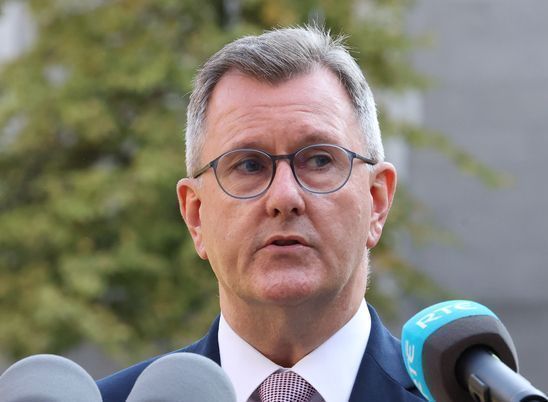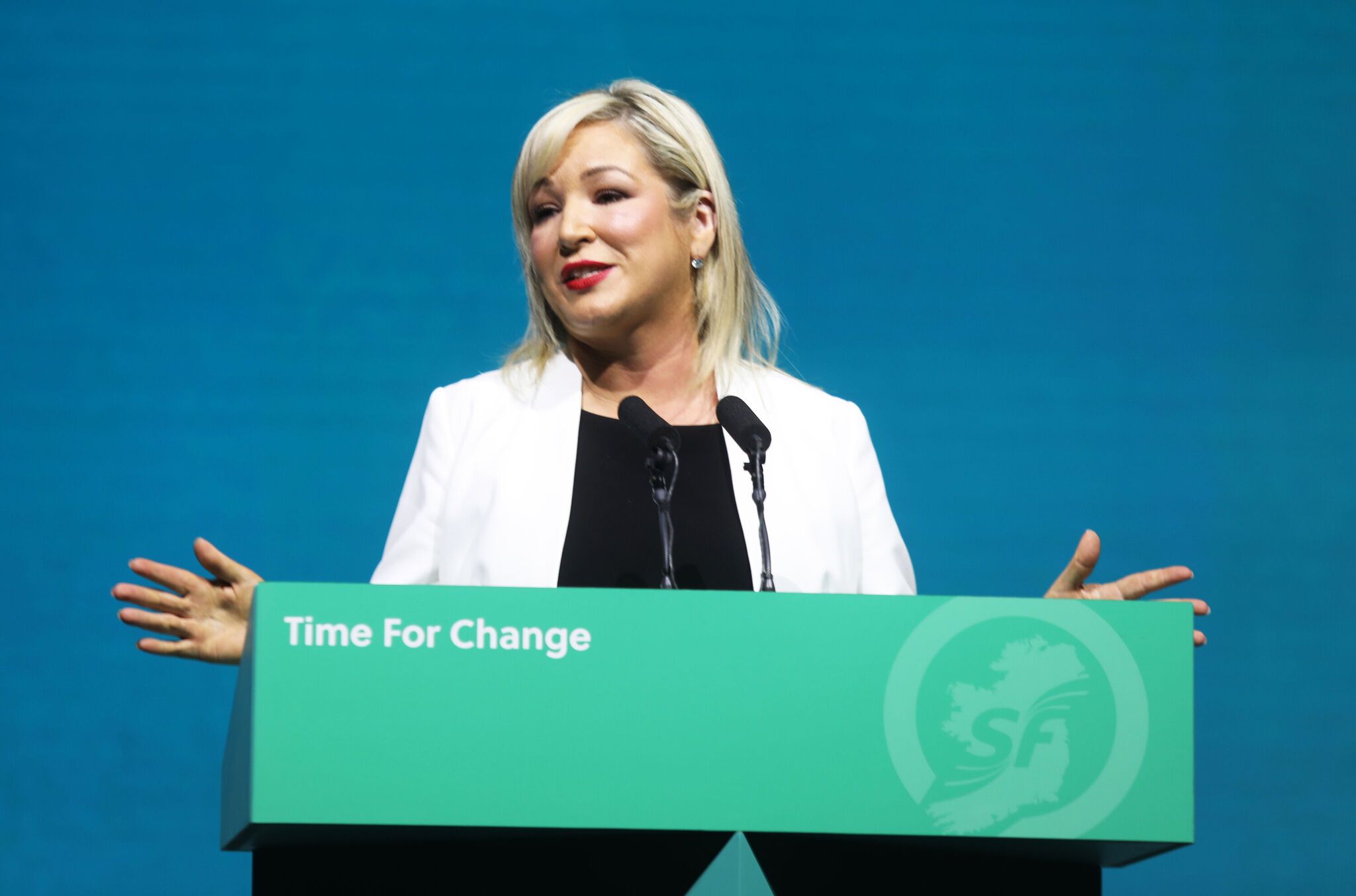The question – will he or won’t he – has yet to be answered. Will Jeffrey Donaldson provide the leadership needed to persuade his party to go back into the Executive or, as Michelle O’Neill pondered at last week’s meeting of the Assembly, have we seen the final sitting of the Assembly?
25 years ago the Ulster Unionist Party endorsed the Good Friday Agreement. It was touch and go. Jeffrey and Arlene Foster walked out just hours before it was agreed and opposed the Agreement in the subsequent referendum.
The UUP then spent years in negotiations with the rest of us as they tried to rewrite the Agreement on terms favourable to unionism. The end result was a succession of Unionist party leaders and a diminishing vote at elections.
Jeffrey Donaldson. RollingNews.ie photo.
The reality is that for the political institutions to work as envisaged in the Agreement unionists and nationalists have to become a partnership. Away back at the time of the Agreement endorsed the Irish and British governments thought that the new Northern Assembly would be led by the UUP and SDLP.
In the end, and after almost a decade of institutions that were more often down, it was Sinn Féin and the DUP that put together a renewed basis for power sharing. But it was always an uneasy relationship. The DUP is largely an anti-agreement party. Political self-interest led it to join the Executive. But sharing power with a party that is nationalist and republican, for ending the union with Britain, and for reuniting the island of Ireland was deeply uncomfortable for many in the DUP, its activist base and voters.
The responsibility of a political leader is to lead. As he contemplates his course of action Jeffrey should remember that negative campaigning in negotiations doesn’t always work. Following on last week’s massive public service strike it is clear that people want local government and local politicians moving forward together.
Brexit brought all of this into sharp focus. For years the border had become less and less of a barrier to movement North and South. The border was in many ways largely transparent economically and new arrangements in health, agriculture, education and employment were slowly emerging. The DUP thought Brexit provided the perfect opportunity to reverse this by rebuilding a hard border on the island of Ireland. It ignored the fact that over half of the people of the North – including many unionists – democratically voted in the 2016 referendum to remain within the EU.
The DUP then sought at every opportunity to force the Tory government of Teresa May into a tough negotiation with Brussels. But British interests are not necessarily DUP or unionist interests. A historic fact that political unionism constantly ignores to its cost. May fell from power and a duplicitous Boris Johnson promised much and then stabbed unionism in the back. Liz Truss was such a disaster that the Tories dumped her after just 50 days in office. They then elected Rishi Sunak, who agreed to the Windsor Protocol with the EU.
In the May 2022 Assembly election Sinn Féin emerged as the largest party. Michelle O’Neill became First Minister designate. A historic moment. Four days later Jeffrey Donaldson announced that the DUP were boycotting the Assembly until London and Brussels made concessions on the Protocol. Was it just a coincidence? Jeffrey has said since then that a nationalist First Minister presents no issue for the DUP. But that is not what he was saying in September 2021. Then he said: “If Sinn Féin were to become the largest party that would present a real problem for unionism.”
In the two years since then the DUP leader has repeatedly told his party and the public that progress has been made in negotiations with the British. Even after the British said that there were no more negotiations he stuck to the line that they were still negotiating and last week again repeated that progress was made. Evidence of that has yet to emerge. Last weekend it was reported that EU diplomats had dismissed claims of ‘secret’ talks between London and Brussels as part of an effort to get the DUP into the institutions. So, the British government should put whatever has been agreed with the DUP on the table for all of the parties and public to examine.
Last Friday the news broke that the DUP officer board was to hold a meeting to decide about going back into the institutions. Depending on which of many ‘sources’ quoted by the media you want to believe it would appear that there is a significant difference of opinion within the ranks of the DUP over next steps. Was Jeffrey about to make a real effort to sell a return to the Executive and Assembly to his party officer board and party executive? Was this scuppered by someone in the party leaking the story?
It is now being suggested that there will be more internal meetings within the DUP in the coming days. The choice is straightforward. Stay out of the Northern Assembly and its interlocking Good Friday Agreement structures or go into these structures on terms not acceptable to a section of unionism. That's the quandary for Jeffrey. It's also proof of the diminished and diminishing influence of political unionism.
The responsibility of a political leader is to lead. As he contemplates his course of action Jeffrey should remember that negative campaigning in negotiations doesn’t always work. Following on last week’s massive public service strike it is clear that people want local government and local politicians moving forward together.
That means Jeffrey telling his party that they are taking their seats in the Northern Executive. If that proves impossible for the DUP then the onus rests on the Irish and British governments, as co-guarantors of the GFA, to produce a Plan B that has to include an Irish-British partnership to provide joint stewardship and an enhanced role for the Irish Government.
Is that where Jeffrey wants to lead us?
RECOGNITION NOW
The Israeli Prime Minister Benjamin Netanyahu has ruled out a post-war peace process that would lead to the establishment of a sovereign Palestinian state. A statement released after he had spoken to President Joe Biden last weekend said: "In his conversation with President Biden, Prime Minister Netanyahu reiterated his policy that after Hamas is destroyed Israel must retain security control over Gaza to ensure that Gaza will no longer pose a threat to Israel, a requirement that contradicts the demand for Palestinian sovereignty."
On the same day in a post on X – formerly Twitter Netanyahu said that Israel must retain "security control over the entire area west of [River] Jordan." This is an area which also includes the Israeli-occupied West Bank territory.
While these remarks have caused outrage the reality is that even before the current genocidal attack by Israeli forces against the people of the Gaza Strip and the West Bank there were some Palestinians who doubted that a two state solution was ever really on the cards due to Israeli opposition.
Natanhayu has made no secret of his desire to create a greater Jewish state. It is part of Zionist ideology. An Israeli state, based on the biblical boundaries from several thousand years ago that includes the Gaza strip and all of the land to the River Jordan.
In 2014 a Sinn Féin motion in the Dáil was passed with government support calling for the recognition of the state of Palestine. Ten years later Leo Varadkar and Micheál Martin refused to take this step. They set recognition as part of the two state solution. But in a context in which the Israeli government blocks such a solution the Irish government is providing Israel with a veto over the democratic rights of the Palestinian people. This is unacceptable.
The Irish government prides itself internationally, and especially at the United Nations, in advocating for human rights. I urge it to implement the motion that was passed by the Oireachtas in 2014 and recognise the state of Palestine. At a time when Israel has killed over 25,000 civilians – mostly women and children – continues to attack hospitals and is digging up cemeteries and destroying bodies, the Irish government needs to take a stand. Recognise the state of Palestine.









